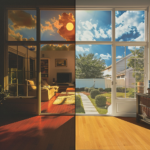
Residential window tinting is an industry that has seen plenty of growth in recent years, due in part to the increased awareness of UVA and UVB exposure. While window film for the home can help block these rays, it can also improve health in several other ways.
Reduces Exposure to Ultraviolet Radiation
Over the last few decades, scientists have discovered that there are two main types of radiation to which people are exposed on a day to day basis—UVA and UVB radiation. When most individuals go outside, they apply sunscreen to the exposed parts of their bodies in order to prevent sunburn or damage to their skin cells. Unfortunately, many people do not realize that UVA and UVB rays can also enter their homes through untreated windows. Home window tinting is a fantastic way to reduce 99% of the harmful radiation that can enter the home through windows, and it provides as much protection as sunblock, if not more.
Improves Condition of Skin
Exposure to sunlight can be drying to the skin, and many dermatologists report that exposure to extreme cold or direct sunlight can sap the moisture from the skin very quickly. Even inside their homes, people of all ages lose moisture to the environment due to the sunlight coming in through their windows. When the windows in the home are tinted, the amount of sunlight coming in through the windows is drastically reduced, therefore improving the moisture in the skin dramatically. In fact, window tinting is much more effective than using sheers or other light-filtering methods.
Reduces Need for Air Conditioning
Window film for the home can help to reduce the need for artificial cooling during the warmer months because it filters the amount of sunlight—and therefore the amount of heat—that enters the home through the windows. When sunlight shines on untreated windows, they heat up; this heat is then transferred into the atmosphere in the home, causing temperatures to warm. While many people use air conditioners in their homes to combat this heating, they remove humidity from the home in the process of cooling the air. As a result, skin dryness and sinus problems can become nuisances. Residential window tinting is a great way to reduce cooling costs and protect individuals’ health.
Protect the Eyes
Both types of UV rays can cause serious eye problems, including cataracts, macular degeneration, pterygia, skin cancer in the areas around the eyes, and actual sunburn on the cornea. While some of these conditions are only realized after long periods of time in direct sunlight, others can occur subtly over a period of years. Wearing sunglasses when going outside is a great way to prevent many of these conditions, but most people do not realize that they are still at risk in their own homes. Tinted windows in the home block most of the harmful UVA and UVB rays, therefore protecting the eyes.
Residential window tinting is just one of many ways to protect the skin and eyes. While many people take the time and energy to protect themselves from the harmful rays of the sun when they venture outdoors, they should also consider window film for the home to protect them while they are inside as well.






Comments are closed.